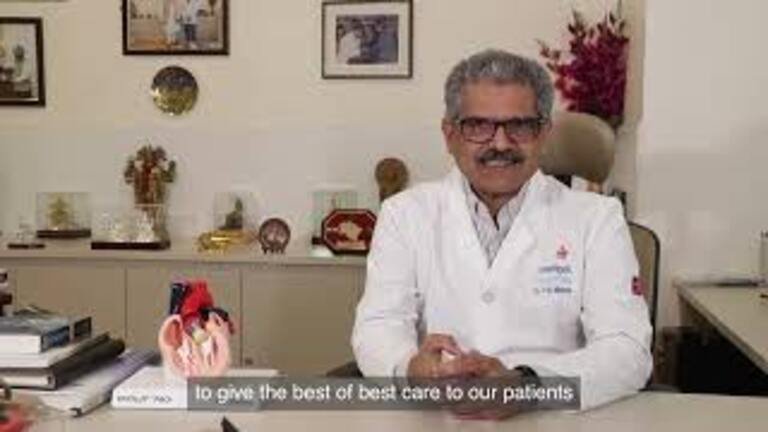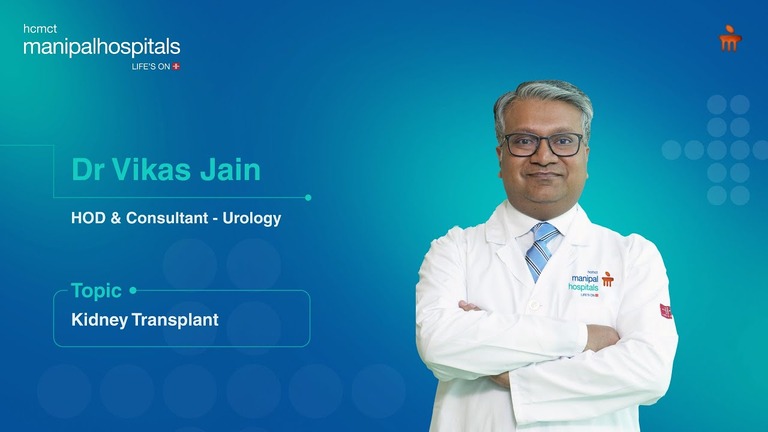

Organ Transplant
Organ Transplant Hospital In Dwarka, Delhi
Organ transplantation is a life-saving surgery that replaces the diseased organ with a healthy organ from a living or deceased person. An organ transplant not only increases the life-span of a patient but also improves their quality of life significantly allowing them to be more physically active and live normally like a healthy individual. Some of the most common organ transplant surgeries include the heart, kidneys, liver, lungs, pancreas, bone marrow and the eyes. Replacing a damaged organ with a healthy organ is a complex and costly procedure. It requires expert surgeons and transplant physicians to avoid complications and revision surgery. Further, it also requires consultation with other departments to declare the patient fit for surgery. The organ transplantation unit at Manipal Hospitals is equipped with ultra-modern facilities and expert care to perform transplant surgeries with the utmost care.

OUR STORY
Know About Us
Why Manipal?
Our organ transplant team has the experience of performing more than 2000 successful transplant surgeries.
We perform both paediatric and adult transplant procedures.
The department is equipped with advanced transplant procedures and highly experienced medical staff.
The organ transplant department is fully assisted by world-class infrastructure, sophisticated laboratories and blood transfusion services.
Manipal Hospitals, being one of the best multi-speciality hospitals in India, patients can access multi-speciality care all under one roof.
Treatment & Procedures
A heart transplant is a surgery to remove the diseased heart from a person and replace it with a healthy one from an organ donor. To remove the heart from the donor, two or more healthcare providers must declare the donor brain-dead. Before you can be put on a waiting list for a heart transplant, a cardiologist makes the decision that this is the best…
The liver is one of the most complex organs playing an important role in the quality of life. Liver transplantation restores a better quality of life and helps patients in living healthy. A pancreas transplant is surgery to implant a healthy pancreas from a donor into a person with diabetes. Pancreas transplants give the person a chance to stop taking…
Sometimes it may be necessary to do multi-organ transplants since the liver or kidneys may be affected by a diseased heart. Heart-liver, heart-lung, and heart-kidney transplants are performed when replacing the heart alone may not be enough to save the patient.
Gastrointestinal (GI) cancer is a group of cancers that affect the gastrointestinal tract and other organs that are contained within the digestive system, including the oesophagus, pancreas, stomach, colon, rectum, anus, liver, biliary system, and small intestine. In earlier days, surgery was a unanimous option and considered the chief curative treatment…
In a kidney transplant surgery, a healthy kidney is transplanted from a healthy donor when the patient's kidneys no longer function. A kidney transplant is usually the last and only option for those suffering from end-stage renal failure and who have been on haemodialysis. The end-stage renal disease occurs when kidneys lose 90 per cent of their normal…
Hepato-pancreato-biliary (HPB) surgery involves surgery of the liver, pancreas, bile ducts and gall bladder. HPB surgeries involve liver resections for liver cancer and other metastatic liver cancers, bile duct cancers, gall bladder cancers surgery, surgery for pancreatic cancer, and Whipple’s resection. Surgeries for benign liver disease as stones…
A highly niche and complex surgery extending up to almost 5-6 hours, the Whipple procedure, or pancreaticoduodenectomy, is the most common surgery to remove tumours in the pancreas. This type of surgery involves not only the removal but also the reconstruction of a large part of the gastrointestinal tract.
The spleen is an organ that is located under your rib cage on the upper left side of your abdomen. It helps fight infection and filters waste material such as old or damaged blood cells from your blood. Splenectomy is a surgical procedure to remove your spleen. This is done when the spleen is ruptured, becomes cancerous, contracts idiopathic thrombocytopenic…
Oesophagectomy is a surgical procedure to remove part of the esophagus which is located between your mouth and stomach, and then reconstruct it using some or all of another organ usually the stomach. Gastrectomy is the removal of part or all of the stomach. The types of gastrectomy include partial gastrectomy which is the removal of a part of the stomach,…
Most of the time, oesophagectomy is done to treat cancer of the oesophagus. A gastrectomy is often used to treat stomach cancer. There are two types of surgeries - Open gastrectomy where a large cut is made in your stomach or chest, and keyhole surgery (laparoscopic gastrectomy) – where several smaller cuts are made and special surgical instruments…
Oesophagectomy poses risks that include infection, bleeding, cough, leakage from the surgical connection of the oesophagus and stomach, hoarseness, acid or bile reflux, respiratory complications, such as pneumonia and swallowing difficulties (dysphagia). Gastrectomy carries a risk of complications, such as infection, bleeding and leaking from the area…
Bowel incontinence can vary in severity from passing a small amount of feces when breaking wind to total loss of bowel control. It is common among women as a possible complication of pregnancy. Though not serious, sometimes surgery is the only option when other treatments have failed to treat an underlying condition. Most people need surgery to close…
Sphincteroplasty is a surgery to repair a damaged or weakened anal sphincter. The damaged muscle is removed by the surgeon who then overlaps the muscle edges and sews them back together to provide support to the muscles and tighten the sphincter. Surgery to close a fistula may be done by gynaecology and colorectal surgeons jointly. Surgical options…
A fistulotomy is an effective surgical treatment for the removal of anal fistulas and haemorrhoidectomy is the preferred surgery to remove internal or external haemorrhoids that are extensive or severe. Surgical haemorrhoidectomy is the most effective treatment for haemorrhoids.
The most common of all inflammatory bowel diseases are Crohn's disease and ulcerative colitis. Crohn’s disease is a chronic inflammatory disease of the digestive tract and symptoms include abdominal pain and diarrhoea, sometimes with blood, and weight loss. Ulcerative colitis occurs when the lining of your large intestine or colon, rectum, or both…
A lung transplant is the last option for those having lung failure from a diseased lung. A new lung can not only save your life but also improve your quality of life after a transplant.

Liver transplantation
The liver transplantation unit at Manipal Hospital performs complex liver transplant surgeries through the extensively experienced liver transplant team in assistance with ultra-modern equipment. The hospital has state-of-the-art liver transplant facilities in the Delhi-NCR region and caters to all kinds of conditions requiring a liver transplant. The liver transplant team at the hospital comprises liver transplant surgeons, hepatologists, interventional radiologists, anesthesiologists, and critical care intensivists. The types of liver transplant surgeries available at the Manipal Hospitals, New Delhi, are:
-
Living donor liver transplantation
-
Cadaveric transplantation
-
Swap transplantation
-
Split donation Liver transplant
-
Combined Liver and Kidney transplantation
-
Combined Liver and Pancreas transplantation
-
Paediatric Liver transplantation in children
-
ABO-incompatible transplant
-
Dual lobe transplantation
-
Domino liver transplant.
The facilities available at the Manipal Hospitals for liver transplants are:
-
Comprehensive radiology evaluation through positron emission tomography-computed tomography (PET-CT), Multidetector computed tomography (MDCT), and magnetic resonance imaging (MRI).
-
Robotic surgery
-
Argon plasma coagulator (APC)
-
Intraoperative ultrasound (IOUS)
-
State-of-the-art operation theatres.
The procedures done by the liver surgical team at Manipal Hospitals include:
-
Liver resection
-
Living-Donor Liver Transplant
-
Deceased Donor Liver Transplant
-
ALPPS Procedure
-
Whipple's Surgery
-
Trisegmentectomy (Right/Left) for Cholanglo Carcinoma.
Manipal Hospitals are equipped with an advanced recovery room required after liver transplant surgery. The condition of the patient is monitored with advanced machines. The patient is also under the care of experienced nurses, dieticians, rehabilitation experts, and other paramedical staff.
Kidney transplantation
Manipal Hospital, New Delhi, has one of the best kidney transplant facilities in India. The kidney transplant team at Manipal Hospitals is highly experienced and has shown excellent long-term transplant outcomes. The kidney transplant team at Manipal Hospital comprises transplant nephrologists, kidney transplant surgeons, anesthesiologists and critical care experts.
During kidney transplantation, the surgeon places a new kidney from either a deceased or living donor. The following types of kidney transplant surgery are done at Manipal Hospitals:
-
Living-related donor kidney transplant
-
ABO-incompatible kidney transplants
-
Robotic kidney transplants
-
Deceased Donor (Cadaveric)
-
Combined Liver Kidney Transplant
-
Pediatric Kidney Transplant
The facilities available at the Manipal Hospitals for kidney transplantation are:
-
24-hour blood bank facilities
-
Modern laboratory facilities
-
Strict infection control practices
-
Convenient environment for both the patients and attendants
-
Sophisticated imaging techniques include 3.5 Tesla MRI machines, a 64-slice CT scanner, and state-of-the-art ultrasound facilities.
-
The Latest Surgical Robot (DaVinci X)
Heart Transplantation
Manipal Hospitals' heart transplantation unit provides the best heart transplant surgery at a highly affordable cost. A heart transplant is a complex procedure and requires the expertise and experience of surgeons and specialists for various therapeutic departments.
Heart transplantation is done in various conditions leading to heart failure, including Valvular Heart Disease, Severe coronary heart disease, Dilated cardiomyopathy, unsuccessful heart transplant, and a congenital heart defect. A heart transplant is the last resort for patients with heart failure after other invasive and non-invasive therapies fail to provide the benefit.
Some of the heart transplant surgeries done at Manipal Hospitals are:
-
Orthotopic procedure
-
Living organ transplant
-
Heterotopic procedure
-
Non-beating heart transplant.
Facilities available at Manipal Hospitals for a heart transplant are:
-
The latest equipment for testing and surgery
-
Echocardiogram
-
Electrocardiogram
-
Dedicated medical and paramedical staff
-
World-class post-surgical care
-
Follow-up after surgery.
During the heart transplant surgery, the cardiothoracic and vascular surgeon replaces the diseased heart with a new healthy heart. The patients undergo recovery from the surgery through a cardiac rehabilitation program. The rehabilitation program allows for faster recovery under the monitoring of medical staff.
Call for action
Are you looking for the best hospital for organ transplantation? Book an appointment with one of the best organ transplant teams in India to get more information and opinions about organ transplants.
FAQ's
Patients visit the Organ Transplant department at Manipal Hospitals Dwarka - Delhi for expert diagnosis, advanced treatment, and personalized care. The department specializes in managing Heart Transplant, Liver And Pancreas Transplantation, Multi-Organ Transplants, Open Laparoscopic And Robotic Procedures For GI Cancers, Kidney Transplant, Liver Gallbladder And Bile Duct Surgeries, Pancreatic Surgeries Whipples Procedure, Splenectomy And Shunt Surgeries, Oesophagectomy Gastrectomy And Colectomies, Solutions In Oesophagectomy Gastrectomy And Colectomies, Complexities In Oesophagectomy Gastrectomy And Colectomies, Surgical Treatment Of Anal Incontinence And Recto Vaginal Fistulas, Solutions In Anal Incontinence And Recto Vaginal Fistulas Surgery, Surgical Treatment Of Complex Anal Fistulas And Haemorrhoids, Surgical Treatment Of Inflammatory Bowel Diseases IBD Crohns Ulcerative Colitis, Lung Transplant, ensuring world-class medical support for patients.
The Organ Transplant department at Manipal Hospitals Dwarka - Delhi provides a wide range of treatments, including:
- Heart Transplant
- Liver And Pancreas Transplantation
- Multi-Organ Transplants
- Open Laparoscopic And Robotic Procedures For GI Cancers
- Kidney Transplant
To book an appointment with a Organ Transplant expert at Manipal Hospitals Dwarka - Delhi, please call 0114 967 4967. Our dedicated team will assist you in scheduling a convenient consultation.
The Organ Transplant department is led by highly qualified specialists, including:
For your initial consultation at Manipal Hospitals Dwarka - Delhi, please bring:
- Medical Records – Previous reports, imaging scans, and lab results.
- Medication List – Details of current and past prescriptions.
- Insurance Details – Health insurance card and referral documents (if applicable).
- Personal ID Proof – For registration purposes.
Providing these documents will help our specialists ensure a comprehensive diagnosis and personalized treatment plan.
Manipal Hospitals Dwarka - Delhi is a preferred choice for Organ Transplant due to:
- Highly experienced specialists.
- State-of-the-art medical infrastructure.
- Comprehensive treatment plans with a multidisciplinary approach.
- Advanced diagnostic & surgical facilities.
- Patient-centric care with personalized treatment options.
We are committed to providing world-class healthcare with compassionate service.
Our organ transplant team has the experience of performing more than 2000 successful transplant surgeries.
We perform both paediatric and adult transplant procedures.
The department is equipped with advanced transplant procedures and highly experienced medical staff.
The organ transplant department is fully assisted by world-class infrastructure, sophisticated laboratories and blood transfusion services.
Manipal Hospitals, being one of the best multi-speciality hospitals in India, patients can access multi-speciality care all under one roof.
There are 8 organs that can be donated: the liver, lungs, heart, kidneys, pancreas and small intestine. Your tissues can also improve the quality of life for many ill people; the tissues you can donate are your skin, corneas, bone tissue including tendons and cartilage, heart valves and blood vessels.
Yes, people with organ transplant have an increased risk of infection. This is because they are on immunosuppressants to prevent organ rejection. These drugs suppress the immune system and make the person vulnerable to infection.
You are eligible for a kidney transplant, if:
-
You are suffering from end-stage renal disease and/or are on dialysis.
-
You are in good health to tolerate the physical and mental stress of major surgery.
-
You do not have any other life-threatening condition, such as advanced cancer, other than renal failure, that reduces your chances of survival.
The survival rate of the patient after a kidney transplant depends upon various factors including the age of the patient, the genetic compatibility with the donor, underlying medical condition, and the occurrence of episodes of rejection. On average, the kidney functions for 10-12 years after transplantation. Many people may also require a second kidney transplant surgery.
The eligibility criteria for donating a liver are:
-
Should be in the age range of 18 years to 55 years
-
Should give free consent and should not be of unsound mind
-
Should not have an underlying medical condition such as hypertension, diabetes or obesity
-
Should have a Liver Attenuation Index (LAI) greater than 5 (liver biopsy to be done if LAI is less than 5)
The time for a stay at the hospital depends upon various factors such as the age of the patient, speed of recovery, and severity of surgical complications if any. The patient, on average, stays at the hospital for around 2-4 weeks. During his stay, the doctor evaluates the vital parameters especially related to heart, monitors organ rejection, and adjusts the dosage and schedule of medications.
The doctor at the best organ transplant hospital in Dwarka, Delhi prescribes the patient various medications. These medications include antibiotics to reduce the risk of infection, painkillers to relieve pain, and immunosuppressants to prevent organ rejection. Most medications are discontinued a few days after organ transplants. However, some medications like immunosuppressants may be required for a longer period.
With the advancements in technology for performing surgeries, a high level of post-surgical care, and innovative medications for preventing organ rejection, the rate of success has significantly increased. To know more, visit the organ transplant hospital in Dwarka, Delhi.
It has been found that patients with live donor kidney transplants have a high survival rate as compared to deceased donor renal transplants. Apart from this, the live donor renal transplant has various other advantages:
-
Reduced time on the waitlist
-
Scheduled transplantation surgery
-
A comprehensive evaluation of the donor’s kidney
-
Avoidance of dialysis ( in pre-emptive kidney transplants)
Get the best treatment at the leading organ transplant hospital in Dwarka, Delhi.
You should have the following lifestyle changes after liver transplantation:
-
Avoid alcohol
-
Exercise regularly
-
Have a healthy diet
-
Avoid beverages containing alcohol
-
Incorporate fiber in your diet
-
Take fresh fruits every day
-
Take food with low sugar, cholesterol, and salt
To know more arrive at the finest organ transplant hospital in Dwarka, Delhi.
A pacemaker is required in case of abnormal cardiac rhythm. Not all patients, after a heart transplant, require a pacemaker. The requirement for the pacemaker depends upon various factors including the underlying cardiovascular conditions, the age of the patient, and an increase in treated rejection incidents. Patients with a pre-plant diagnosis of ischemic cardiomyopathy may require a pacemaker. Get the best treatment at the top organ transplant hospital in Dwarka, Delhi.
Patients that may require heart transplants are:
-
The patient should have end-stage heart disease, such as significant heart failure or advanced cardiomyopathy, which is not managed by other treatment options.
-
The condition of the patient indicates an increased risk of mortality if the transplantation is not done.
-
Patients should not have other conditions that reduce their chances of survival.
-
The patient should not be obese
-
Patients should be psychologically stable and of sound mind to understand the risk and benefits of surgery.
-
Patients should be healthy to tolerate the stress of surgery and post-surgical recovery.
-
The patient is committed to following the instruction of the surgeon before and after the surgery.
Get a consultation at the topmost organ transplant hospital in Dwarka, Delhi to know more about the treatment.
Explore Stories



You’re on Our Indian Website
Visit the Global site for International patient services























.jpeg)
